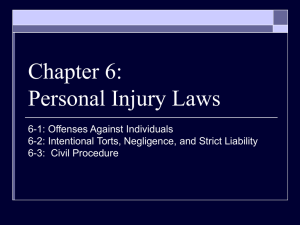Torts & School Liability: Presentation on Negligence & Legal Cases
advertisement
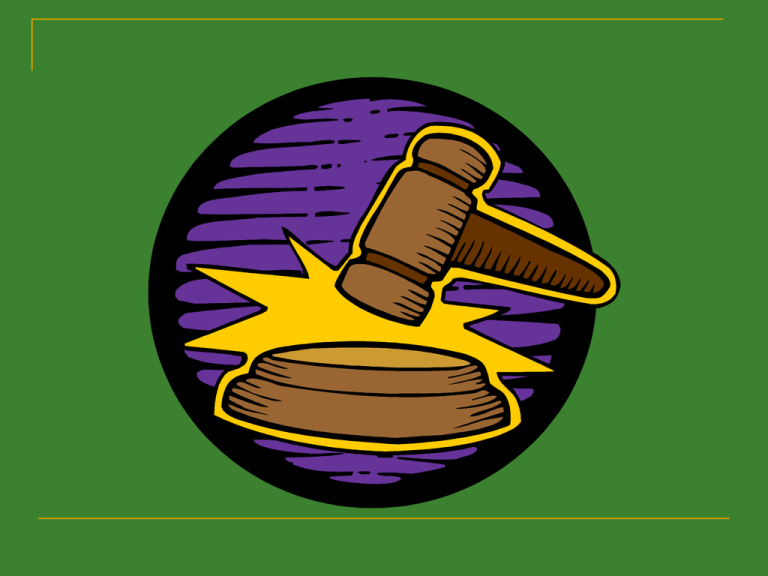
Pop Quiz: 1. A. B. C. D. A tort is which of the following: Surfer slang for “tortilla” A really old French word Short for torture Having to do with Civil or implied Rights Answer: Tort An act or omission which unlawfully violates a person’s right created by law and for which the appropriate remedy is a common law action for damage by the injured person. (Ambulance Chasers and Playground Lawyers) •From French •Action •Civil law (civil rights) •Rights •Negligence •On purpose •Wrongdoing •Damages / Compensation Continued A tort is different from a crime and emanated from a separate and distinct body of law. Exemplary or Punitive Damages Damages requested and/or awarded in a lawsuit when the defendant's willful acts were malicious, violent, oppressive, fraudulent, wanton or grossly reckless. (law.com) malicious cause harm Intentional or unintentionally Examples: Intentionally doing something malicious, and expressly knowing that it is not in someone’s best interest. An ex-husband trashes his former wife's auto and threatens further property damage. Negligence Neither expected, nor intended but a reasonable person could have expected or intended the harmful results. (645) Preventable accident Failure to exercise an appropriate standard of care Causal connection between the act and the injury Reasonable Person Breach of Duty Failure to satisfy ethical, legal, or moral obligations, specially where someone has a corresponding right to demand the satisfaction. Negligence Ignoring Focusing somewhere else Standard of Care A legally recognized duty requires the actor to conform to a certain standard to conduct or care Duty Different for adults vs. children The standard of care of the woodshop teacher is greater that that of the librarian. Watch: Quiz Section: Who can end up in court and why? Who are the potential defendants? Who are the potential plaintiffs? What would the plaintiff try to show? What would the courts look at? Which is an example of a Tort? A. B. C. D. Speeding ticket An Injury Being pushed Tripping over an extension cord Watch: Jeopardy Click me! Spears v. Jefferson Parish School Board In this case, a PE teacher played a practical joke on a kindergarten student by pretending to have killed two of his classmates for misbehaving. The district was found liable for tort damages for emotional harm. Fallon v. Indiana Trail School In this case, a sixth grade student suffered a spinal injury incurred on a trampoline during P.E. The student had been adequately spotted and supervised. The parents decided to sue the district saying that the trampoline was inherently dangerous and therefore subject to the strict liability standard of tort. The courts found for the school district, saying that the trampoline was not abnormally dangerous. Brown v. Tesack In this case, two teenage boys found partially filled cans of an extremely flammable liquid in a school’s dumpster during summer recess and used them to start fires in their housing project. One of their neighbors was injured, taking a fireball to the chest. The school district was found liable of neglect for breach of duty and reasonable care in disposing of the fluid. Brownell v. Los Angeles Unified School District In this case, a student was shot and wounded by gang members after school hours and on a street adjacent to school property. The district was found not guilty of negligence because it was found that there was no way the incident could have been foreseen, thus prevented, and fulfilled its duty of reasonable care. Johnson v. School District of Millard In this case, a first grader endured a cut requiring 50 stitches after being thrown into a bookcase while playing London Bridge is Falling Down in music class. The teacher was not watching the children when the accident happened and was in fact writing on the blackboard. The court found that the teacher was guilty of negligent supervision and a reasonably prudent teacher could have foreseen injury. Richard v. Corvallis Public School District No. 1 In this case, a parent walked her son into school to excuse his tardiness. On the way back to her car (taking the same path as before), she slipped and fell on the snowy path and sustained injuries. The court held that the school did not breach its duty to maintain premises in reasonably safe condition and could not have anticipated the injury. There were no hidden or lurking dangers. Stein v. Asheville City Board of Education In this case, a bus driver failed to notify principal about a student’s conversation regarding robbery and murder overheard on the school bus. The next day, the two students robbed and shot Stein in the head causing substantial injuries. The court held that no legal duty existed due to the ability to control the students after school hours when the shooting occurred and that the attack was unforseeable. Walmuth v. Rapides Parish School Board In this case, a school district was found not liable for a student injured in a locker room fight. The court held that the event was unforeseeable and that the coach and Board had not acted unreasonably by failing to constantly supervise the students in the back of the locker room. Stevens v. Chesteen In this case, a student excused from P.E. due to a preexisting knee injury, was injured on the sidelines of a game of touch football. The teacher was not present and was in a storage shed, on the visitor side of the field and not present at the time the injury occurred. The courts found that the teacher had not neglected his duty and a brief absence from class does not constitute a breach of duty of reasonable supervision. Funston v. School Town of Munster In this case, a spectator was injured when he fell from a set of bleachers after leaning back (the bleachers had no back and were not pushed against a wall). The court found that the spectator’s conduct fell below the standard to which he should conform for his own protection and safety and was therefore, contributorily negligent and such negligence was a proximate cause of his injuries. Hutchison v. Toews In this case, a fifteen year old student was injured while using an explosive built with materials taken from school. The court found him to be contributorily negligent because he had knowledge of the risk. Aaris v. Las Virgenes Unified School District In this case, a cheerleader injured her knee performing a gymnastic stunt (cradle) at cheer practice. She had received adequate training in safety and knew the risk. The court held that under the doctrine of primary assumption of risk a cheerleader is barred from recovery for damages in negligent action. Hammond v. Board of Education of Carroll County In this case, a female football player who was injured claimed that the school district was liable because it failed to warn her of the inherent risks of playing. The courts found that she assumed the normal, obvious risks of injury in choosing to play tackle football. Wagenblast v. Odessa School District No. 105-157-166 This case found that school districts cannot exculpate themselves from liability for negligence by requiring parents to sign a release. The act is invalid and violative of public policy. The only time it would be valid is if it meets the “6”: the agreement concerns an endeavor of a type suitable for public regulation, the organization is performing a great act of service, the party will perform the service for any member of the public, the party possesses a decisive advantage of bargaining strength, the party confronts the public with a standardized adhesion contract and the public seeking services must be placed under the control of the furnisher of the services. Donohue v. Copiague Union Free School District In this case, the plaintiff states that even though he received a certificate of graduation, he lacks even rudimentary skills to fill out job applications and charged the district with educational malpractice. The court held that educational malpractice is not a cognizable cause of action in tort law and that the plaintiff should have taken advantage of the administrative processes available.
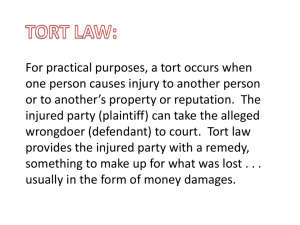
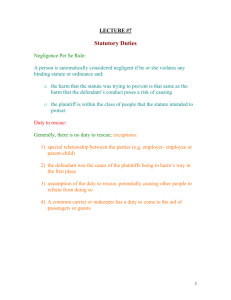
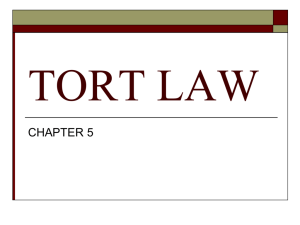
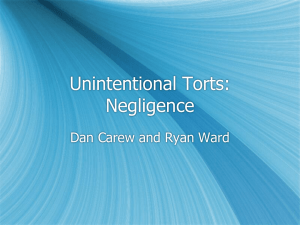

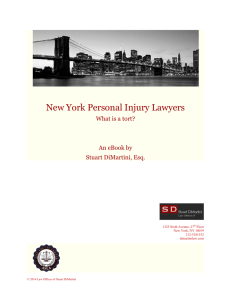
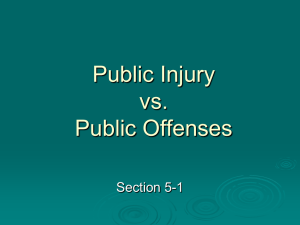
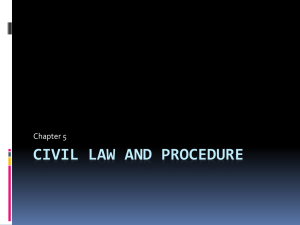
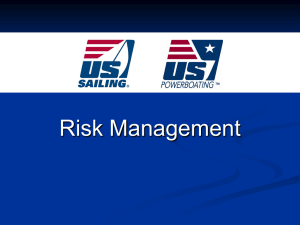
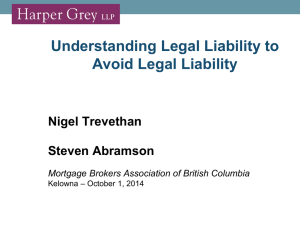
![Legal Phil Unit 8[1]](http://s2.studylib.net/store/data/005765299_1-dc4a11d7fcd357e684dc37049d520026-300x300.png)
